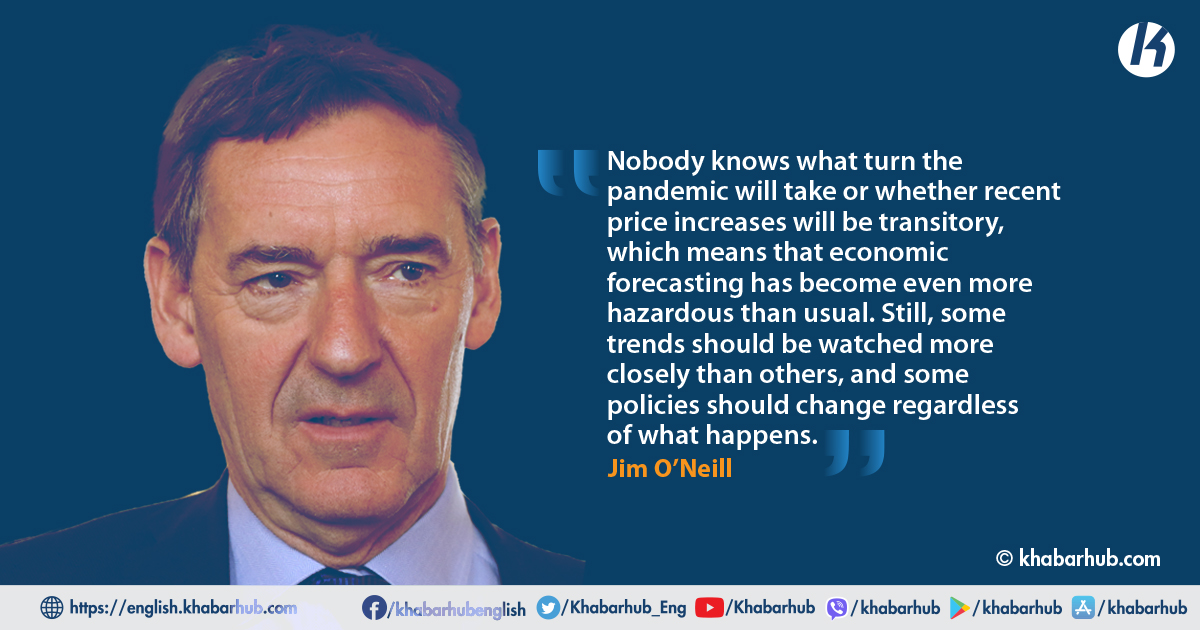With the calendar year drawing to a close, the parlor game of pretending to know what will happen in the next 12 months has begun.
Yet when it comes to 2022 (and beyond), I am not sure whether it is worth even pretending. I cannot recall a previous time when there were so many big question marks looming over so many key economic issues.
This deep uncertainty is especially intriguing with respect to financial markets. Should any of several developments to watch take a negative turn, the implications for today’s elevated markets could be dire.
Among the most urgent and topical issues, other than COVID-19, is inflation. Are this year’s price increases transient, or do they represent something more ominous? My useless answer is, “I don’t know.”
Although I did suggest at this time last year that inflation would become a bigger issue than weak GDP growth, now, as I look ahead to 2022, I am far less sure.
Much of today’s inflationary pressures could still relate to the speed of the recovery in many economies, and, of course, to large, still-persisting supply disruptions.
But the supply shortages themselves may be symptoms of bigger problems, such as economic over-stimulation, ineffective monetary policies, or weak productivity growth.
The implications for financial markets would be quite different depending on which of these factors are at work, and to what extent.
Many other big questions for 2022 are related to inflation as well. What is the purpose of monetary policy in today’s economy?
Whether the increasingly important Chinese economy can be better integrated into the global economy remains to be seen. It is anyone’s guess what twists and turns the pandemic will take. Will Omicron quickly become the new dominant variant, or will it be supplanted by yet another one?
Should we still worry about government debt levels, or have we discovered (by some fluke) that we never needed to worry about this? I am generally open minded, but I do have some strong suspicions in this particular debate.
On fiscal policy and the idea that government debt becomes problematic at some precise level, the events of 2020-21 have demonstrated that much of the conventional thinking was wrong. Far more important is what the debt is for. Debt incurred to prevent a collapse in economic activity is quite different from debt incurred simply to fund an overly ambitious government’s agenda.
On monetary policy, it was clear even before the pandemic that the post-2008 world of endless central-bank generosity had outlived its usefulness.
We have long needed to get back to a relationship where inflation-adjusted interest rates bear some resemblance to potential GDP growth rates.
While excuses can be made for a brief suspension to manage a major shock like COVID-19, the persistence of ultra-loose monetary policies seems misplaced.
As acolytes of Milton Friedman contend, these policies may even be responsible for the recent surge of inflation. It is rather convenient that after years of struggling to achieve higher inflation rates (near or above their stated targets), central banks now have chosen to regard inflation as temporary.
In fact, central bankers have no better idea than you or I do about whether inflation will last. But even if it does turn out to be transitory, the justification for a generous monetary policy is increasingly dubious.
After all, by creating loose financial conditions, central banks are contributing to the growing suspicion that the fruits of modern capitalism are primarily for those privileged few who own assets.
Quietly looming over these issues is the central question of productivity growth, which has been disappointing across most advanced economies for many years.
Do pandemic-driven behavioral changes and innovations herald the long-awaited return of robust productivity gains?
I have one foot in the optimistic camp, which is partly why I do not see the need for so much monetary stimulus. But, given the persistent disappointments of the past decade, I cannot confidently plant both feet there.
Yet another major issue is global poverty, which has started to increase again over the past two years. Eliminating this scourge would appear to be an even bigger challenge than the energy transition.
As always, policymakers are touting an intention to do more to boost productivity. One hopes they are more serious now than they have been in the past.
As if these challenges and unknowns were not tricky enough, there is also a long list of non-conventional macro issues to consider.
Whether the increasingly important Chinese economy can be better integrated into the global economy remains to be seen. It is anyone’s guess what twists and turns the pandemic will take. Will Omicron quickly become the new dominant variant, or will it be supplanted by yet another one?
And what about other major threats such as the silent pandemic of antimicrobial resistance or the risks associated with climate change?
As matters stand, it seems unlikely that voters – particularly older cohorts on limited or fixed incomes – will tolerate repeated hikes in energy price, even if they are a necessary feature of the transition to cleaner alternatives. As I recently suggested, policymakers will need to think creatively about how to deal with this problem.
Yet another major issue is global poverty, which has started to increase again over the past two years. Eliminating this scourge would appear to be an even bigger challenge than the energy transition.
Finally, there is the pervasive uncertainty about global governance. Unlike in the 2008-10 period, when the G20 proved so effective, there has been almost no meaningful progress on global economic cooperation in 2020-21. Let us hope that 2022 brings a vast improvement on this front.
(Jim O’Neill, a former chairman of Goldman Sachs Asset Management and a former UK treasury minister, is a member of the Pan-European Commission on Health and Sustainable Development)
Copyright: Project Syndicate









Comment